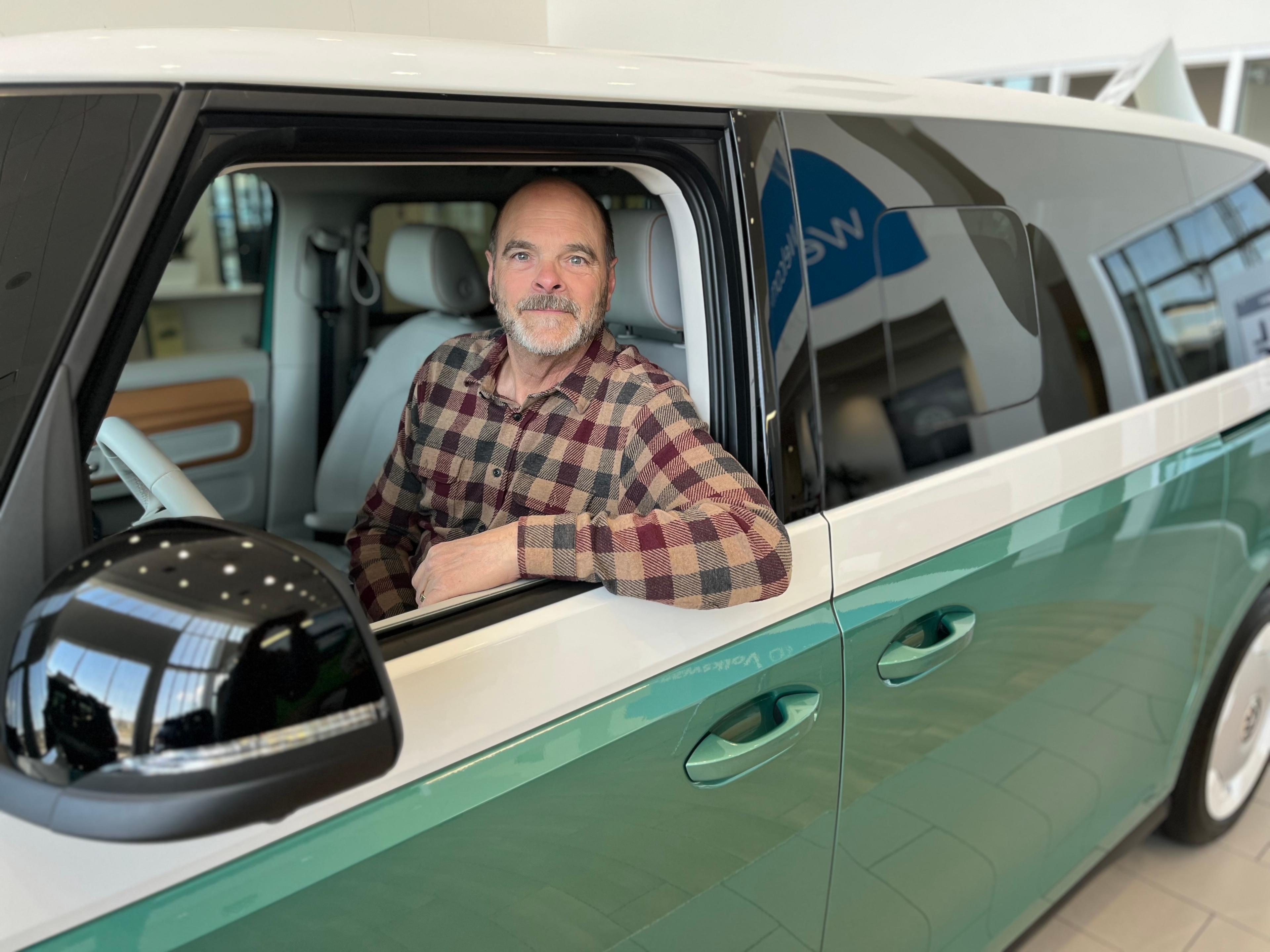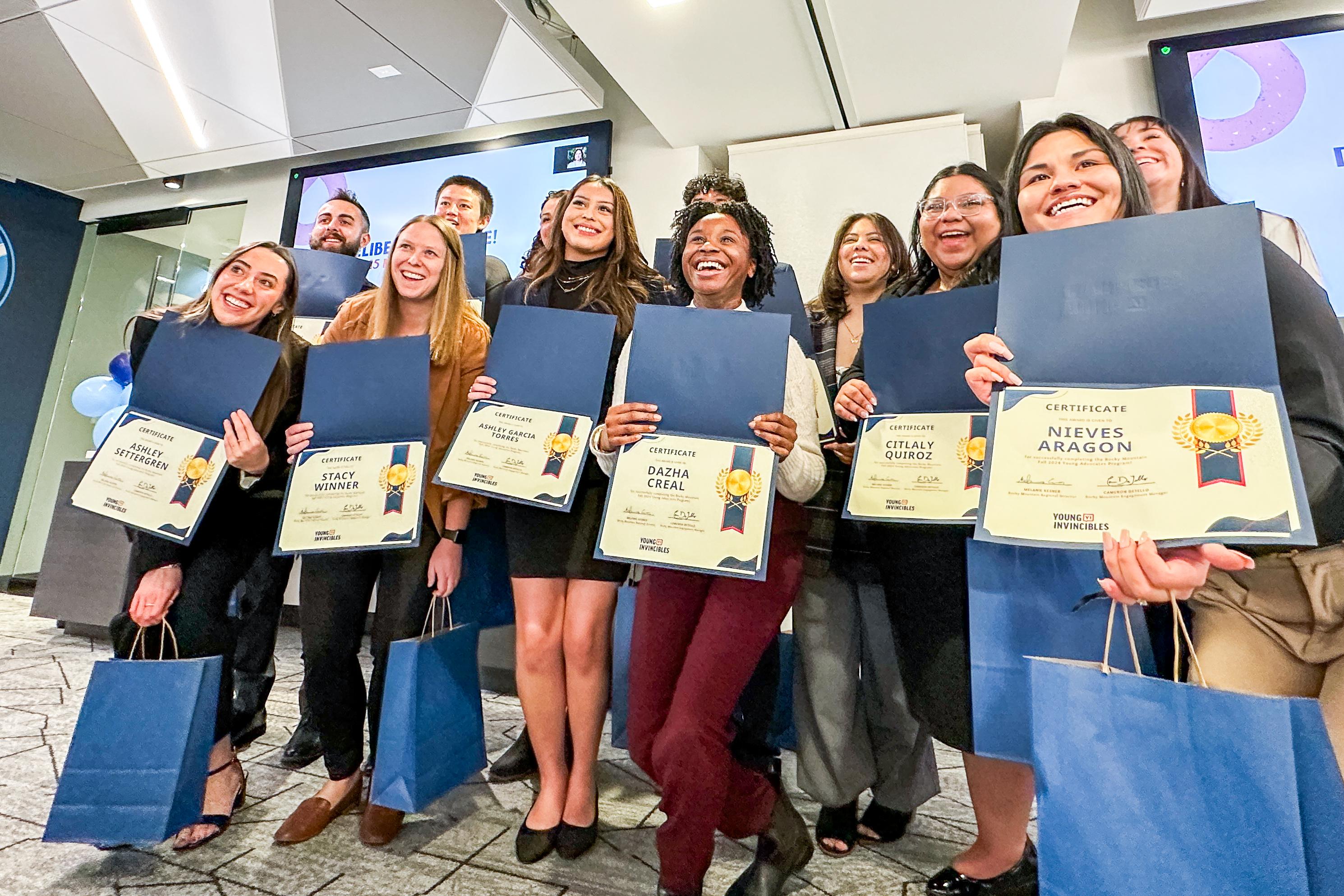
The Colorado legislature fires up in just a few weeks. Where do all the ideas for legislature come from?
Sometimes from young advocates.
We attended a legislative policy Shark Tank (the best kind!) where four teams of young advocates pitched policy proposals addressing challenges in higher education, health care and workforce development.
Through a 12-week internship with the advocacy nonprofit Young Invincibles, the young people, ages 18 to 34, researched and developed proposals. They pitched them recently to a panel of judges.
Which of the four ideas would you pick as the winner?
Team 1: Refinancing private student loans
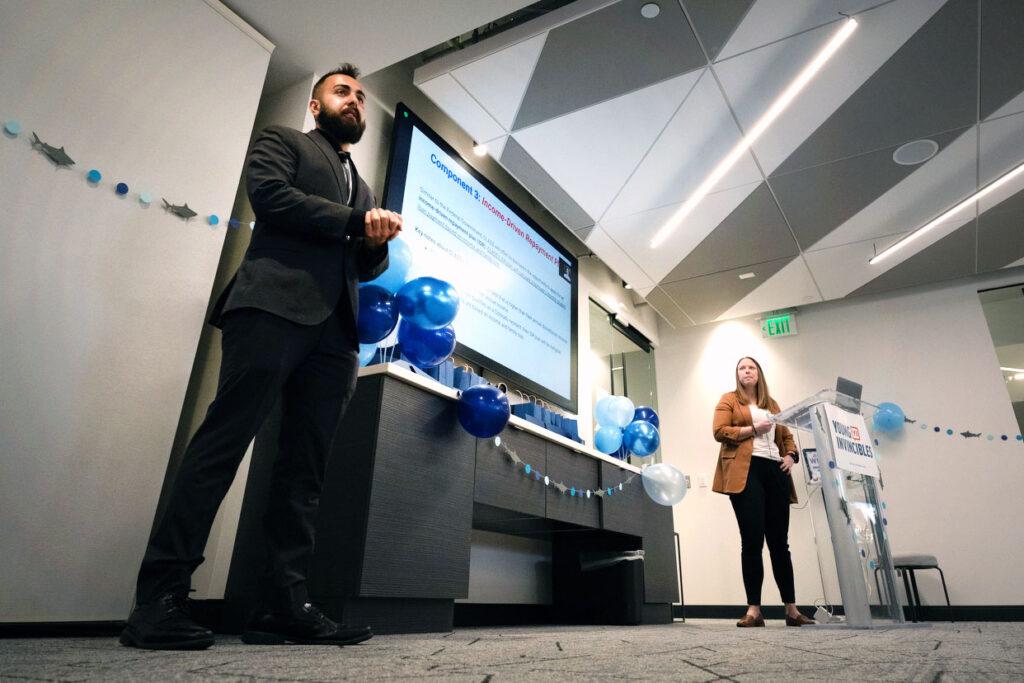
Problem: Higher education is increasingly unaffordable even with financial aid. Many students must take out high interest private loans and that affects the economy.
“If you're living paycheck by paycheck, and you have to save money to pay off your loans,” said Matthew Miranda, age?. “You're not going out to eat at a restaurant, so you're not putting money into the economy.”
Go deeper: A family with a household income of $80,000 must still pay about $20,000 out of pocket for one year of university education, according to Team 1. Average interest rates for private lending run between 10 percent to 17.9 percent, repayment plans are less flexible and are not based on how much income you are earning. The only way to lower one’s monthly payment is through refinancing but that depends on credit scores and can significantly raise monthly payments even with lower interest rates.
Solution: A state loan program called the Colorado Loan Assistance for Students and Scholars (CLASS) would provide lower interest rates and flexible repayment options for graduates who work in underserved or high-need areas. For example, Texas has the CAL program that provides low-interest loans to students who have unmet financial needs. Colorado would offer a fixed interest rate such as 6.30 percent on loans that wouldn’t be sold to a third-party lender.
The state would pay off the private loan of graduates of Colorado universities and refinance it. The team estimates those who refinance a 20-year loan of approximately $50,000 would save more than $27,000 compared to staying with a private lender. Miranda calculates that the state would make more than $40,000 off that 20-year loan.
The final component would allow students to refinance private loans using an income-driven repayment program based on the borrower's income and family size. The catch here is you must stay a Colorado resident. That ensures the state benefits from income, sales, and property taxes, and fees. Team 1 proposes placing a ballot tax measure before voters to ensure the loan program’s long-term sustainability.
Team 2: Confronting implicit bias in health care
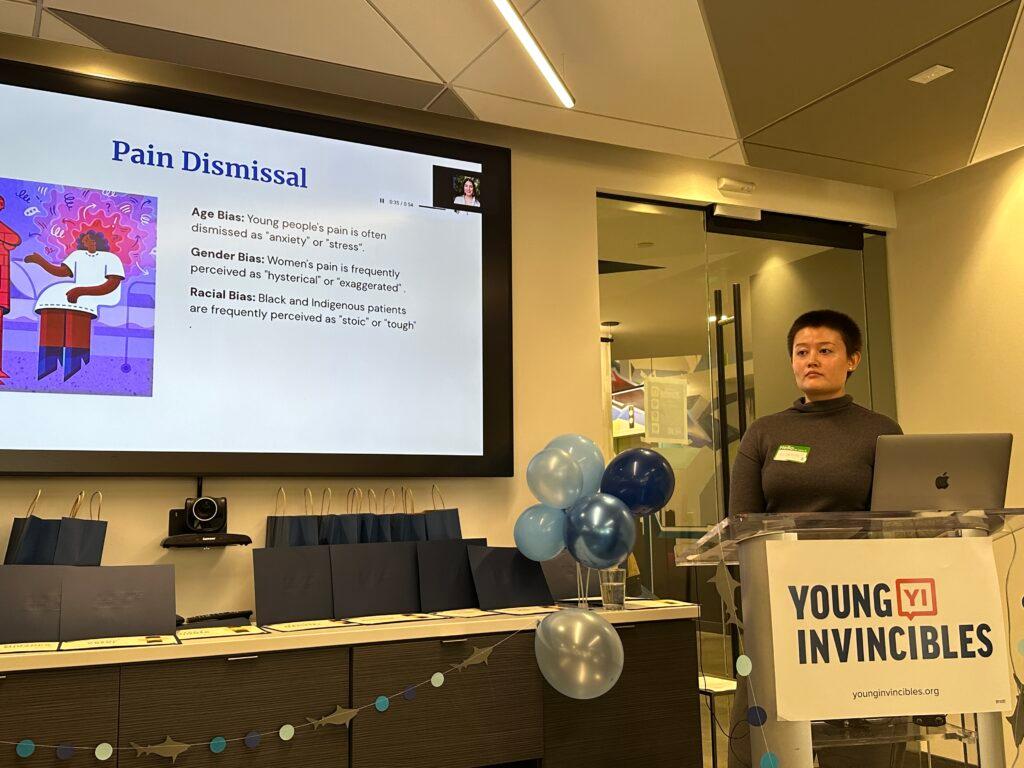
Problem: Many health care patients from marginalized populations may not get top-notch health care treatment due to bias and implicit bias. One in six people report feeling dismissed or ignored by a health care professional, according to a 2023 survey on health access in Colorado.
Go deeper: This particularly affects young adults, women and people of color. These groups may also avoid health care due to the fear of discrimination. Examples of bias include practitioners attributing young people’s pain or symptoms to anxiety or stress, women’s pain as hysterical or exaggerated and Black and Indigenous patients as “stoic or tough” which leads to an underestimation of their pain and inadequate treatment for their health care conditions.
Solution: Amend a Colorado law on continuing education for physicians to require one of the 30 CME (Continuing Medical Education) credits for medical provider licensing and relicensing to be in implicit bias training. This group recognized there is a lot of provider burnout now so the team chose to start with one hour of training.
“Long-term savings would result from the amendment both by reducing misdiagnoses, lowering treatment times as well as preventing over-reliance on emergency services, which we see is quite high,” Katherine Kim, age?, said.
Both California and Michigan have mandated implicit bias training.
Team 3: Helping undocumented college graduates find jobs
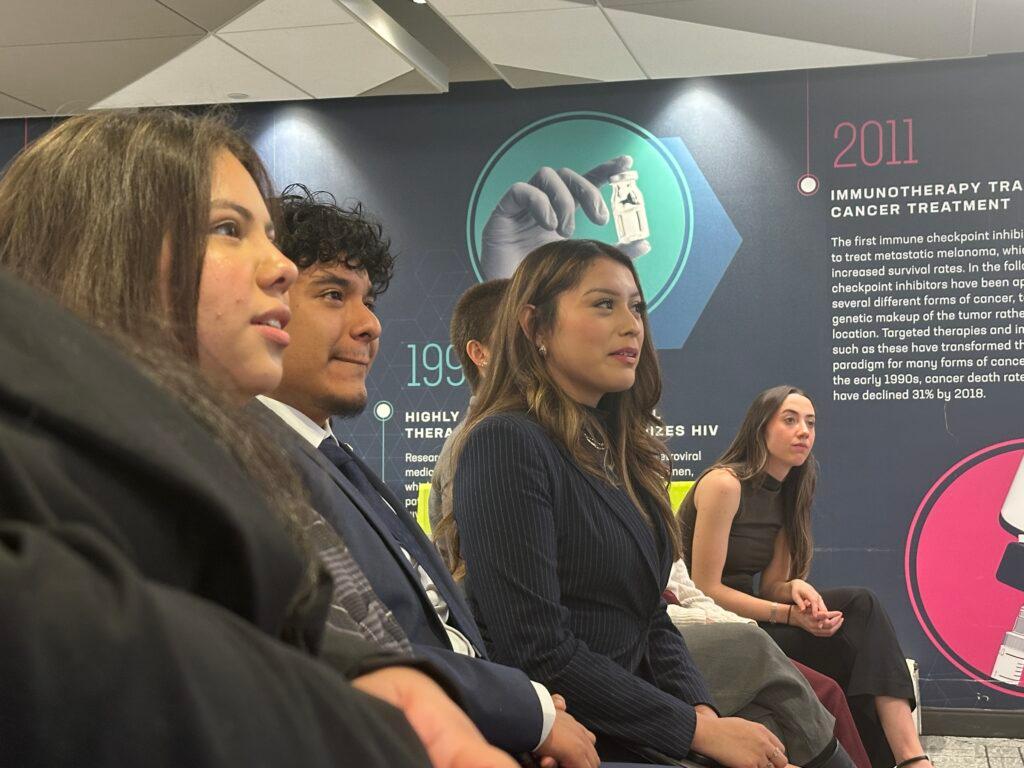
Problem: Undocumented students who don’t have temporary protection from DACA (Deferred Action for Childhood Arrivals) and who’ve graduated from a Colorado high school can receive in-state tuition here. However, many still struggle to find jobs after graduation. Undocumented students make up 1.6 percent of those getting degrees.
“Many of us graduate with degrees but face limited career opportunities because we can't legally work in our fields,” said Citlaly Quiroz, who is a citizen. “It's like being handed a key to a door that won't open.”
Go deeper: Team 3 members said there is limited work authorization and a lack of comprehensive support to navigate a complex system. The group said the idea is crucial now with the political climate expected to change when President-Elect Donald Trump takes office next year. They said undocumented immigrants contributed more than $400 million in state and local taxes in 2022 and estimated if there were work authorizations for recent graduates, that contribution would rise to more than $500 million.
Solution: The Colorado Employment Pathways Support Act aims to create employment pathways for undocumented students after graduation in Colorado. It's expected to cost less than $1 million. It would include personalized case management to help graduates navigate work authorization and would create incentives for businesses to hire graduates. For example, there might be tax credits for businesses to apply for H1-B visas for workers who are otherwise not authorized to work in the U.S. (The group researched several Colorado companies who they say collectively sponsor 3,000 visas annually.) The proposed measure would also include grants and training for graduates who want to start a business.
Team 4: Medicaid mobility between colleges
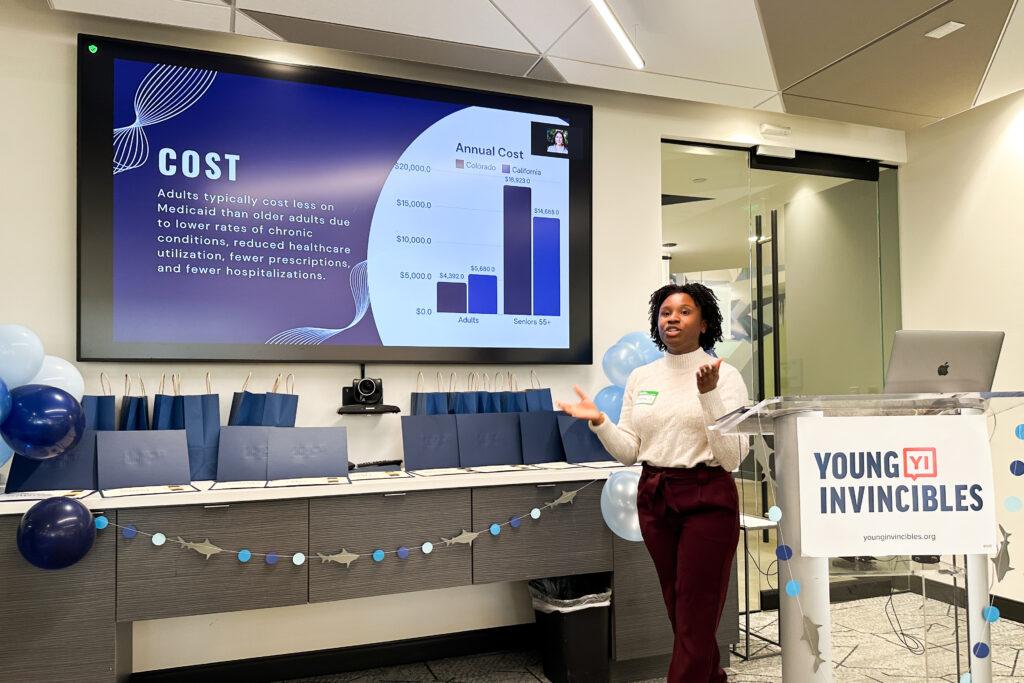
Problem: Students who attend college out of state have two options for health insurance – opting into university health insurance, which ranges between $3,000 and $7,000. or applying for Medicaid. If you do the latter, however, you will lose Medicaid in your home state. That causes problems when a student travels back home for work in the summer or other breaks. There is a lack of awareness of health care options for students.
Go deeper: Seventeen percent of undergraduate students in Medicaid “expansion” states are on Medicaid, and other states don’t allow students to apply for Medicaid. Mental health providers can only treat patients in states they are licensed in, so if a student is in another state, they can’t stay with the same provider even online. (Colorado does allow out-of-state students to apply to Medicaid if they intend to stay post-graduation. ) Only 10 percent of people on Medicaid have college degrees so transferability could help boost that number.
“Hopefully they will become economically sustainable and have a job that allows them to have insurance rather than relying on Medicaid,” said DaZha Creal.
Solution: The long-term solution is a federal policy change allowing college students on Medicaid to stay on Medicaid in any state. Students would submit a “dual state” Medicaid application. The program would have a cap to ensure equity between states. In the short term, the team is proposing educating students and making each state’s Medicaid information readily available online and through federal student aid email communications. For example, providing a simple infographic where students can easily click on a state to see what Medicaid eligibility requirements and benefits are.
And the winner is ...
Team 3! They proposed the Colorado Employment Pathways Support Act, which aims to help undocumented students get jobs in high-demand fields after graduation proposed by Citlaly Quiroz, Manuel Marquez Avalos, Ashley Garcia Torres, and Stephanie Maldonado. The group even drafted sample legislation.
“The one thing about this proposal is it kind of had the sweet spot between the equity impact and the feasibility at the end of the day,” said judge and former state lawmaker Chris deGruy Kennedy, who is currently the president of the Bell Policy Center. “But I think all of these are ideas that could move forward and could have a really powerful impact on people.”
The team was thrilled. Manuel Marquez Avalos said through conversations he’s had with college classmates and friends, the issue is having profound psychological consequences for students.
”There's this sense of hopelessness,” he said. “Even though they were at school they felt like it was leading to nothing and I really thought that that was an issue that should be addressed.”
The winning pitch will be added to the Young Invincible’s 2025 (and 2026 if needed) policy agenda for the coming legislative session. The organization will be reaching out to legislators so the young advocates can pitch their proposals to potential bill sponsors.

